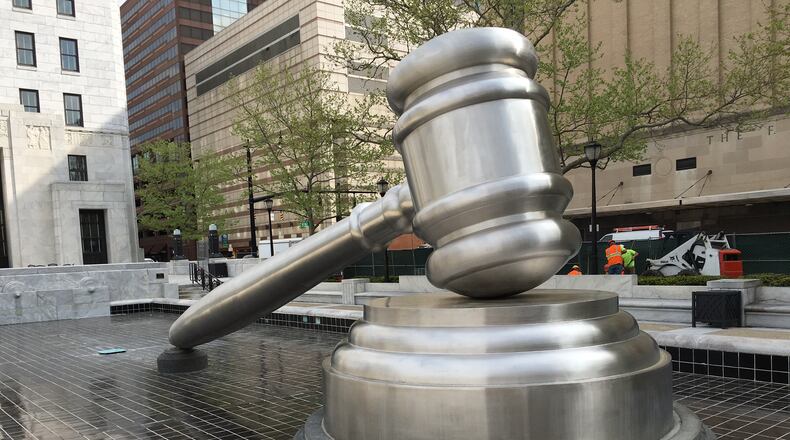Dayton Municipal Court suspended all evictions until April 30. Kettering, Miamisburg, Oakwood, Vandalia, Xenia and Fairborn courts have also done so.
Ohio Gov. Mike DeWine signed a bill on Friday that gives courts more flexibility in how long it takes to hear criminal, civil and administrative cases, protecting those going through the eviction process. Other states, like New York, have indefinitely suspended eviction hearings.
Federally, U.S. President Donald Trump signed the Coronavirus Aid, Relief and Economic Security Act (CARES Act) into law. The law includes immediate protections for tenants and homeowners.
The Ohio Supreme Court has issued guidance, asking local courts to stop eviction proceedings and “tolling” or freezing the time that people have to file a case. But there is nothing in the court’s order that specifically orders courts to stop hearing evictions.
“So it is helpful, but it’s not an order, so courts are still free to hear eviction cases,” said Debra Lavey, an attorney with Advocates for Basic Legal Equality (ABLE). “That presents challenges to tenants on so many different levels. Like, do I have to go to court? The court’s website doesn’t say anything, I’ve called the court and no one is answering, so I don’t know.”
As of Monday, Lavey said ABLE knew of 18 municipal courts out of 54 in its 32-county service area in northwest Ohio that were still evicting and moving people out. Last week there were 30 courts still hearing eviction cases.
The city of Dayton, ABLE, Legal Aid of Western Ohio (LAWO), Miami Valley Community Action Partnership and Miami Valley Fair Housing Inc. came together to create an informational web page to answer questions about evictions.
The website includes information about what to do if someone is facing or being threatened with eviction. It also has some information on the CARES Act. The website being updated as new information comes available.
“The biggest challenge is that many of (ABLE’s clients) were already living on the edge and this virus is going to put them over the edge,” Lavey said. “Many of them were living paycheck to paycheck and now so many of them are without a paycheck. I understand money (in the form of a federal stimulus check) is on the way but that will take some time and if landlords continue to have eviction hearings, folks could get evicted before that money even comes.”
RELATED: Coronavirus puts strain on homeless system, officials say
ABLE has been advocating locally to keep people in their homes. The organization has also been advocating at the state level through the Ohio Poverty Law Center and on the federal level to protect tenants through eviction moratoriums, foreclosure moratoriums, rental or mortgage assistance to help people stay in their homes during this difficult time.
Lavey said ABLE and LAWO are still representing clients in scheduled court hearings if courts are open. Montgomery County Municipal Court is continuing all its cases until after May 6.
Jim McCarthy, president and CEO of the Miami Valley Fair Housing Center Inc., said that for people whose evictions have been halted, they should not feel they have to move unless law enforcement officers come to their door.
“You of course have to comply with law enforcement, but if just management comes and tells you to move out, you don’t have to,” McCarthy said.
The web page encourages people to try to work with their landlords if they cannot pay rent. It also informs tenants of their rights.
MORE: Coronavirus: Traffic drops, roads empty as virus keeps Ohioans home
“Your landlord cannot discriminate against you, kick you out, or ask you to leave your apartment because of fears and stigma around COVID-19, including discrimination or harassment on the basis of actual or perceived race, national origin, disability, or other protected classes,” the website says.
McCarthy said the order around evictions from the Montgomery County Municipal Court still isn’t clear. McCarthy and Lavey said they have tried to stop several move-outs and evictions ordered through the Montgomery County Municipal Court Eastern Division.
Amy Weimer, bailiff for the Montgomery County Municipal Court, said the court canceled move-outs and has suspended eviction hearings for 30 days, starting on April 1. She said she was not aware of any move-outs happening last week or the week prior.
MORE: Coronavirus: Real ID deadline extended after states close BMV offices
Lavey said she got a call late last week from someone in the Miami Valley who was scheduled to be moved out by the Montgomery County Municipal Court Eastern Division. Lavey contacted the court and was told that move-outs had been cancelled but they will be rescheduled.
“I was told that no order was issued by the court, just the judge telling the bailiff to stop the move-outs. As you can imagine, this is very confusing for many tenants and advocates,” Lavey said.
Lavey said ABLE doesn’t know how many courts are still moving people out.
“It’s very confusing. It’s not very transparent,” Lavey said.
Lavey said the coronavirus pandemic will reveal gaps in America’s social safety net and hopes it will allow for a conversation around homelessness and affordable housing.
“I think we’re going to see this with this crisis that what happens to the most vulnerable affects us all, which it really always has, but we’ll have sort of a new set of eyes to see that through this crisis,” Lavey said.
About the Author

